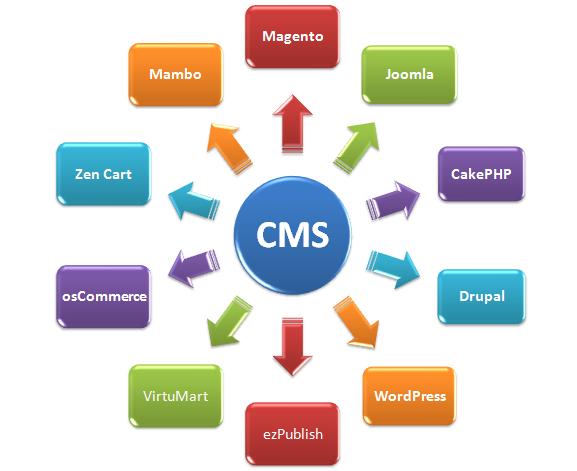CMS (or Content Management System) is a website management tool with publishing features and an administration interface. It is a family of software which allows the design and dynamic updating of websites, blogs, forums or multimedia applications.
Ideally, a CMS must have a workflow system that allows a team of editors to work simultaneously on editorial content of the wiki, blog, webpage or forum. Articles and site content are usually stored in database, while templates switch the layout of the content depending on the type of content.

How it works
CMS consists of a set of files readable by a browser, usually written in PHP and a MySQL database containing all the information of the site. When a visitor requests the displaying of a page of the site, the Web server through script files on the site, interrogates the database and displays the contents which match the query.
Features
All CMS share the following features:
- They have a CMA (Content Management Application) element which allows the content manager or editor, who may not know hypertext markup language, to manage the creation, modification, and removal of content from a website without needing the expertise of a webmaster.
- They have a CDA (Content Delivery Application) element which uses and compiles that information to update the website. The CMS fully automates the publishing of your website.
Features of a great CMS solution:
- CMS allow the administrator and/or trusted people to publish documents and articles on the website. It allows the administrator of a website to prioritize and assign roles and permissions (anonymous, user, administrator, contributor, moderator…).
- Most CMS have an RSS feed automatically updated when publishing new articles.
- WYSIWYG Editors which let you add, edit, publish and modify the contents of your website without any knowledge of HTML.
- The CMS should be flexible enough to accommodate your needs and requirements. Rather than following technology as a default setting, it should seek to allow separation of design and content. Most of CMS offers a template editor.
- Internal search by keyword on the entire contents.
- An easy-to-use media, stylesheet and article management.
Popular CMS
What is wordpress?.
WordPress CMS allows you to create and administrate blog. Note that you can also create a forum with the plugin bbPress. Wordpress is the largest self-hosted blogging tool in the world, used on hundreds of thousands of sites and seen by tens of millions of people every day. If you want to learn more about wordpress, you can go to this page:
What is Joomla!?.
Joomla! is an award-winning Content Management System which will help you to build websites and other powerful online applications. Best of all, Joomla! is an open source solution that is freely available to everybody. You can download the latest version on the official page.
What is Drupal?
Drupal is often one of the first choices when building a new website. Drupal can be scaled for personal blogs or enterprise mega-sites, and like WordPress there are thousands of plugins that can be added to modify your blog’.
PHPBB.
Phpbb is one of the oldest and popular forum software which keeps track with other forum software by releasing new versions (and new versions). PhpBB supports almost all the database management systems. It is free and open source, here is the download link: create a forum with phpbb.
Simple Machine
Simple Machines Software is a professional grade solution offered for free. This CMS offers full flexibility of customizing the forum to your needs and requirements.
ExpressionEngine (aka EE) is an elegant, flexible CMS solution for any type of projet; blog, websites and web applications. However, it is not a free CMS. Designed to be extensible and easy to modify, EE sets itself apart in how clean and intuitive their user administration area is.

Delhi Courses Academy is a leading institute offering the best digital marketing course in Delhi, known for its practical training, affordable fees, and industry-focused curriculum. With 15+ certifications, 100% placement assistance, and hands-on projects, it prepares students for real-world challenges.

